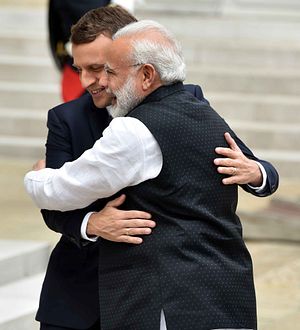Two years after the last visit by his predecessor, Francois Hollande, who was chief guest at the Indian Republic Day parade in 2016, French President Emmanuel Macron will be in India this week on a four-day trip. Soon after Macron’s election in May 2017, Indian Prime Minister Narendra Modi visited France, underlining his resolve to give a new meaning to Indo-French partnership. Bilateral ties between New Delhi and Paris today cover a gamut of issues including defense, maritime, space, security, and energy. The two nations have managed to carve out a forward-looking partnership that is aimed at strengthening bilateral cooperation on issues such as terrorism, climate change, sustainable growth and development, infrastructure, urbanization, and science and technology.
This is a relationship that is truly strategic in its orientation. Macron will be co-chairing the International Solar Alliance (ISA) with Modi during his visit and the two leaders will also inaugurate a solar power plant at Dadar Kala village in Uttar Pradesh. The ISA is a major Indo-French initiative with around 56 countries having signed the ISA Framework Agreement and 26 nations having already ratified it. It provides a common platform for cooperation among sun-rich nations with the aim of significantly ramping up solar energy, thereby helping to contain global greenhouse emissions as well as providing clean and cheap energy. It is also the first treaty-based international organization to be based in India.
Guided by their desire for strategic autonomy, India and France have been traditional partners and have adapted well to the changing global context. Paris was at the forefront of the campaign to call for a complete integration of New Delhi in the global nuclear order. The United States came much later. French help was crucial for India to enter the multilateral nuclear architecture. During Macron’s visit, the two nations are likely to sign a pact between NPCIL (Nuclear Power Corporation of India Limited) and EDF (of France) on six nuclear reactors.
At a time when India is redefining its strategic space in the wider Indo-Pacific, there is great potential in Indo-French collaboration in the Indian Ocean. While India is engaging the United States, Japan, and Australia as part of the “Quad” initiative, a close bilateral partnership with France is evolving in the region, especially in the Western Indian Ocean. French military bases in Djibouti, Abu Dhabi, and Reunion Island can be a force multiplier for India, which itself is looking to build naval facilities in Seychelles, Mauritius, and Oman. During Macron’s visit, both countries will be signing agreements that will allow India logistics access to French military bases in the Indian Ocean. The two nations will be hoping that this sharing of military facilities will lead to greater interoperability between their navies and much closer maritime cooperation including through maritime domain awareness. As China undercuts India’s geographical advantages in the Indian Ocean, New Delhi needs partners like Paris to preserve its equities in the region and to continue to play its traditional role of regional security provider. In this context, working towards the eventual goal of interoperable navies that can use each other’s naval facilities will certainly result in a more effective security architecture in the Indo-Pacific.
Defense cooperation between France and India has been growing steadily too. The multi-billion dollar deal for 36 Rafale fighters was signed in 2016 and, despite generating some political controversy, it remains India’s best bet to boost its diminishing air capability. France remains a major partner for India in developing various key military platforms including the Scorpène submarines. During the visit of French Defense Minister Florence Parly last October, the foundation stone for the Dassault Reliance Aerospace Limited (DRAL) manufacturing facility was laid at Mihan in Maharshtra. It is a joint venture between French aerospace firm, Dassault Aviation, and India’s Reliance Group and is the first private facility for production of Rafale fighter jets and Falcon civilian aircraft. The two navies regularly conduct joint exercises and their scope has been widening over the years. The “Varuna” series of joint maritime exercises began in 2000 and have become integral to institutionalized interactions between the two navies. It is India’s own vulnerabilities in the defense sector that have impeded even closer Indo-French defense cooperation.
The underpinnings of global geopolitics are being rapidly altered with China’s inexorable rise, the West being consumed by internal problems and Russia, the “America First” priorities of the Trump Administration, and growing threats to globalization. This is a time for nations like India and France to take the lead and shape the narratives as well as the emerging institutional frameworks. Macron’s visit will once again alert New Delhi and Paris to the immense possibilities which exist in Indo-French bilateral partnership and there are growing signs that the political leadership in both countries are keen to exploit them.

































